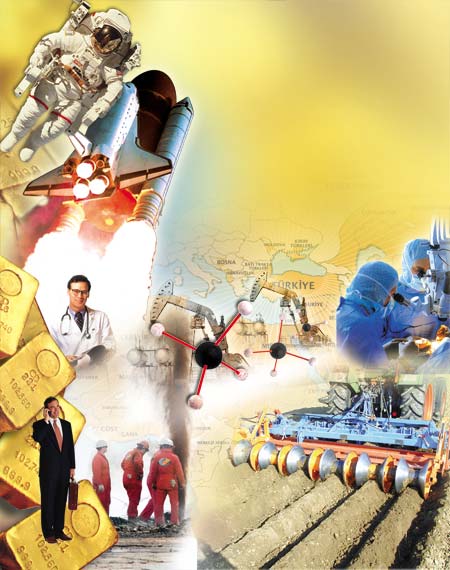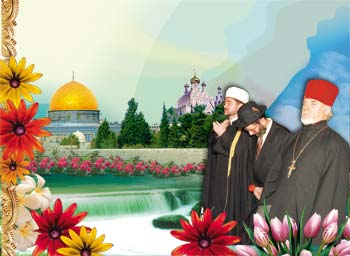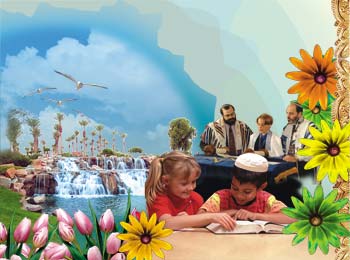Many thinkers today describe the future of the Turkish-Islamic world as something having a direct impact on world peace and security. With its population of some 1.5 billion, its underground wealth and strategically important location, the Turkish-Islamic world is a great power.
Many thinkers today describe the future of the Turkish-Islamic world as something having a direct impact on world peace and security. With its population of some 1.5 billion, its underground wealth and strategically important location, the Turkish-Islamic world is a great power.
 |
Most Muslim countries were under colonial occupation until World War II, and became independent only after it. This led to important changes in global politics. The real change in the Turkish-Islamic world began with the ending of the Cold War. The Turkish-Islamic world came to represent a Eurasian expanse of land stretching from Albania and Bosnia to Chechnya and Tajikistan. The change in Muslim settlement patterns also affected the Turkish-Islamic lands.
Until the 20th century, apart from short-lived occupations, Muslims had generally inhabited lands under Turkish-Islamic rule. From the early 20th century on, however, they began migrating to Europe and America, where they came to represent a significant part of the population.
Islam is now the most rapidly rising faith in America and many European countries and the increasing numbers of Muslims are enabling them to play an influential role in social and political life. In this way, the Turkish-Islamic region is not just restricted to countries with a majority Muslim population or are under Muslim control. This provides a significant advantage for the Turkish-Islamic world but also brings with it problems that need to be solved without delay.
 |
One of the most striking characteristics whenever the Turkish-Islamic world is considered is the rupture in communications among Muslims. There have been wars between Muslim countries, such as the recent Iran-Iraq War, the Iraqi invasion of Kuwait and the war between Pakistan and Bangladesh. The civil wars and conflicts in Muslim countries mostly due to ethnic and political questions, such as in Afghanistan, Yemen, Lebanon, Iraq or Algeria, show that Muslims are far from having attained the requisite level of unity. The fact that the Turkish-Islamic world has failed to achieve internal unity has caused many Muslim countries to lag behind in development. Although the Turkish-Islamic world possesses broad material resources and human potential, it has not yet reached the desired level in science, technology, art or education.
There is therefore an urgent need for a central body that will overcome the rupture in communications between countries in the Turkish-Islamic world, resolve issues and bring about social, political and economic co-operation.
Very different religious views, interpretations and models apply across the Turkish-Islamic world. There is no central body to determine what is really compatible with Islam and what is not, to direct the Muslims of the world in general on the subject, and to reconcile them with one another. The Catholics have the Vatican, for instance, and Orthodox Christians have the Patriarchate, but there is no central body to establish unity on religious and social matters in the Turkish-Islamic world.
Yet unity lies at the heart of Islamic moral values. Following the death of our Prophet (may Allah bless him and grant him peace), the Islamic world was led by the Caliphate, which served as a guide on social and religious issues.
There is an urgent need today for a contemporary center to guide the Turkish-Islamic world and be effective in the resolution of day-to-day issues. It seems that it will only be possible to establish decision-making bodies based on democratic principles and the supremacy of law through the establishment of the Turkish-Islamic Union.
Such a union will play an important role in eliminating disagreements and conflicts, in developing co-operation between member countries and in Muslims acting as one.
The largest Muslim organization to gather Muslims together under one roof today, in terms of delegate numbers and their geographical distribution, is the Organization of the Islamic Conference with 56 member countries. In addition, there are also various regional, trade and military alliances among Muslim countries sharing common regions. All of these are important steps in terms of developing a spirit of union and solidarity. But the Turkish-Islamic world needs a more comprehensive union with permanent institutions and decision-making powers to develop and implement common policies, to be the common voice of all Muslims, and to take an interest in and resolve the problems, not just of certain regions, but of the whole Turkish-Islamic world.
 |
| “The way that members of different religions are today killing one another and driving one another from their homes is nothing more than a totally mistaken radicalism. In essence, Allah has sent down all three faiths, and all three command peace, love and brotherhood.” |
The Turkish-Islamic world must become a single military, political and economic bloc. A Turkish-Islamic world that has established internal unity will also guarantee world peace and provide no environment for certain radical elements and supporters of a “clash of civilizations.” It particularly needs to be said that solutions must be implemented as a matter of urgency. That is because every day sees efforts to produce an artificial “clash of civilizations” between the Turkish-Islamic world and the West. The founding of the Turkish-Islamic Union will totally eliminate this danger.
Historical experience clearly shows different civilizations living together is no reason for tension and conflict. Nonetheless, there are those who want enmity and conflict rather than understanding and reconciliation in both the West and the Islamic world.
Members of different faiths killing and exiling one another is nothing more than an error of radicalism. In essence, Allah has sent all three faiths down to earth and these religions all command peace, love and brotherhood. For that reason, it is incompatible with religious moral values to stand up in the name of religion and incite fighting and conflict. Religious devotion is a totally different thing from inflicting harm by way of various false beliefs that are not present in the holy scriptures and that were added on subsequently.
Allah forbids evil and corruption. He holds no society above any other, but states that superiority lies only in taqwa (sincerity and genuine devotion to Allah). Allah reveals in the Qur’an:
“Mankind! We created you from a male and female, and made you into peoples and tribes so that you might come to know each other. The noblest among you in Allah’s Sight is the one with the most taqwa. Allah is All-Knowing, All-Aware.” (Surat al-Hujurat: 13)
When conflict erupts somewhere, true believers’ duty is to douse the flames and protect peoples’ lives and property. When the Prophet Jesus (pbuh) returns in the age we are living in, as the members of all three revealed faiths await, he will bring with him peace, love and brotherhood.
Therefore, true believers have a duty to comply with Allah’s pronouncements regarding peace and love clearly stated in holy scriptures and through His messengers. The establishment of the Turkish-Islamic Union that embraces the essence of Islamic moral values is urgently needed for this climate of peace to come about at once.
 |  |